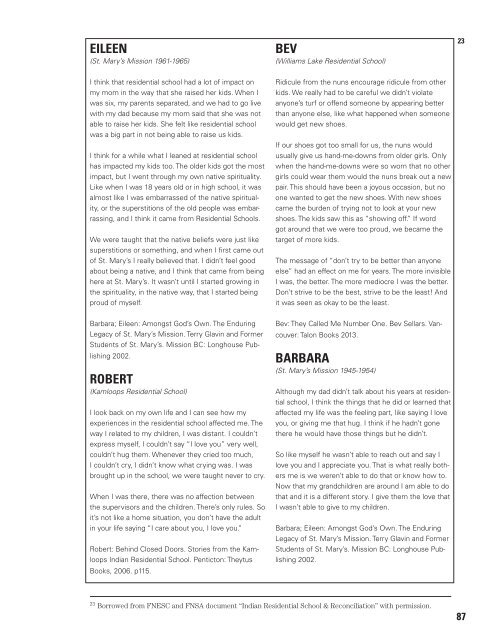Residential Residential
Residential_School
Residential_School
You also want an ePaper? Increase the reach of your titles
YUMPU automatically turns print PDFs into web optimized ePapers that Google loves.
EILEEN<br />
(St. Mary’s Mission 1961-1965)<br />
BEV<br />
(Williams Lake <strong>Residential</strong> School)<br />
23<br />
I think that residential school had a lot of impact on<br />
my mom in the way that she raised her kids. When I<br />
was six, my parents separated, and we had to go live<br />
with my dad because my mom said that she was not<br />
able to raise her kids. She felt like residential school<br />
was a big part in not being able to raise us kids.<br />
I think for a while what I leaned at residential school<br />
has impacted my kids too. The older kids got the most<br />
impact, but I went through my own native spirituality.<br />
Like when I was 18 years old or in high school, it was<br />
almost like I was embarrassed of the native spirituality,<br />
or the superstitions of the old people was embarrassing,<br />
and I think it came from <strong>Residential</strong> Schools.<br />
We were taught that the native beliefs were just like<br />
superstitions or something, and when I first came out<br />
of St. Mary’s I really believed that. I didn’t feel good<br />
about being a native, and I think that came from being<br />
here at St. Mary’s. It wasn’t until I started growing in<br />
the spirituality, in the native way, that I started being<br />
proud of myself.<br />
Ridicule from the nuns encourage ridicule from other<br />
kids. We really had to be careful we didn’t violate<br />
anyone’s turf or offend someone by appearing better<br />
than anyone else, like what happened when someone<br />
would get new shoes.<br />
If our shoes got too small for us, the nuns would<br />
usually give us hand-me-downs from older girls. Only<br />
when the hand-me-downs were so worn that no other<br />
girls could wear them would the nuns break out a new<br />
pair. This should have been a joyous occasion, but no<br />
one wanted to get the new shoes. With new shoes<br />
came the burden of trying not to look at your new<br />
shoes. The kids saw this as “showing off.” If word<br />
got around that we were too proud, we became the<br />
target of more kids.<br />
The message of “don’t try to be better than anyone<br />
else” had an effect on me for years. The more invisible<br />
I was, the better. The more mediocre I was the better.<br />
Don’t strive to be the best, strive to be the least! And<br />
it was seen as okay to be the least.<br />
Barbara; Eileen: Amongst God’s Own. The Enduring<br />
Legacy of St. Mary’s Mission. Terry Glavin and Former<br />
Students of St. Mary’s. Mission BC: Longhouse Publishing<br />
2002.<br />
ROBERT<br />
(Kamloops <strong>Residential</strong> School)<br />
I look back on my own life and I can see how my<br />
experiences in the residential school affected me. The<br />
way I related to my children, I was distant. I couldn’t<br />
express myself, I couldn’t say “I love you” very well,<br />
couldn’t hug them. Whenever they cried too much,<br />
I couldn’t cry, I didn’t know what crying was. I was<br />
brought up in the school, we were taught never to cry.<br />
When I was there, there was no affection between<br />
the supervisors and the children. There’s only rules. So<br />
it’s not like a home situation, you don’t have the adult<br />
in your life saying “I care about you, I love you.”<br />
Robert: Behind Closed Doors. Stories from the Kamloops<br />
Indian <strong>Residential</strong> School. Penticton: Theytus<br />
Books, 2006. p115.<br />
Bev: They Called Me Number One. Bev Sellars. Vancouver:<br />
Talon Books 2013.<br />
BARBARA<br />
(St. Mary’s Mission 1945-1954)<br />
Although my dad didn’t talk about his years at residential<br />
school, I think the things that he did or learned that<br />
affected my life was the feeling part, like saying I love<br />
you, or giving me that hug. I think if he hadn’t gone<br />
there he would have those things but he didn’t.<br />
So like myself he wasn’t able to reach out and say I<br />
love you and I appreciate you. That is what really bothers<br />
me is we weren’t able to do that or know how to.<br />
Now that my grandchildren are around I am able to do<br />
that and it is a different story. I give them the love that<br />
I wasn’t able to give to my children.<br />
Barbara; Eileen: Amongst God’s Own. The Enduring<br />
Legacy of St. Mary’s Mission. Terry Glavin and Former<br />
Students of St. Mary’s. Mission BC: Longhouse Publishing<br />
2002.<br />
23<br />
Borrowed from FNESC and FNSA document “Indian <strong>Residential</strong> School & Reconciliation” with permission.<br />
87


